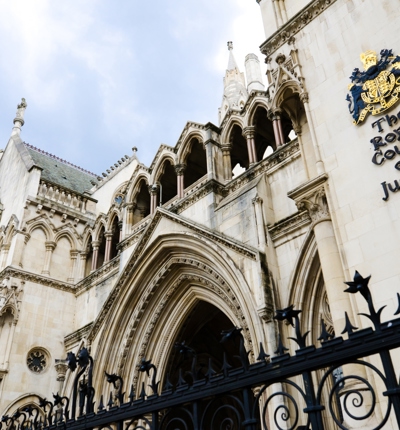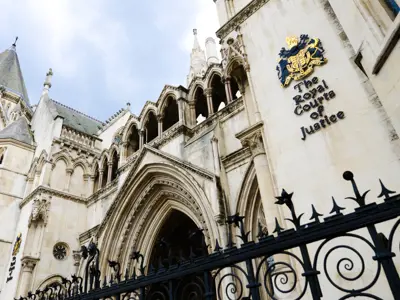
Appeal Court judges divided over unlawfulness of decision to allow new Surrey oil wells
Court of Appeal judges were divided over an appeal brought by campaigner Sarah Finch in which she argued that Surrey County Council acted unlawfully when it decided to grant planning permission for new oil wells and oil production at Horse Hill near to Gatwick Airport in September 2019.
Posted on 18 February 2022
Sarah Finch has campaigned with others against the proposed expansion of the Horse Hill site, which would result in oil production well into the 2040s, including five drilling cellars, four hydrocarbon production wells, four gas-to-power generators, a process and storage area and tanker loading facility, seven oil tanks, each with a 1,300-barrel capacity and a 37-metre drill rig.
In the judgment handed down yesterday one of three judges agreed with Sarah Finch and intervenor Friends of the Earth that the council should have assessed and considered the “downstream” greenhouse gas (GHG) emissions that will be produced by the burning of 3.3 million tonnes of oil that is likely to be extracted from the Horse Hill wells over the next 20 years before it decided whether or not to grant planning permission for the proposed development.
However, the other two judges disagreed and the case was dismissed.
Despite that result, campaigners have achieved the following victories for the environment in this judgment, namely:
- All of the Judges accepted that “downstream” GHG emissions are (contrary to the High Court ruling) legally capable of being indirect effects of this type of fossil fuel project (see paragraphs 43 and 141(iv);
- Other such fossil fuel projects may legally require assessment of those emissions (see paragraph 67); and
- Those emissions (contrary to Surrey County Council’s submissions) can be scientifically calculated (see paragraph 71)
In the judgment handed down yesterday, Thursday 17 February, the appeal was refused.
Sarah Finch was represented in her appeal by Leigh Day, Marc Willers QC (Garden Court Chambers) and Estelle Dehon (Cornerstone barristers).
Sir Keith Lindblom, Senior President of Tribunals said:
Para 65 “I cannot agree with the submission that “scope 3” or “downstream” greenhouse gas emissions were sufficiently connected to the proposed development to create for the county council an effective obligation in law to require their assessment as indirect effects under the EIA Directive and the EIA regulations.”
Lord Justice Lewison, who allowed the claim to go to the Court of Appeal for “compelling reasons”, agreed, adding in the deciding judgment that:
Para 149 “Whether the downstream greenhouse gas emissions were or were not to be regarded as indirect effects of the project was a question of judgment for Surrey CC. Although it would have been preferable for more explicit consideration to have been given to that question, I have concluded (not without hesitation) that the reasons just about pass muster.”
However, Lord Justice Moylan took the view that the decision to allow planning permission for the oil wells was unlawful. He said:
Para 139 “The fact that the EIA failed to identify, describe and assess the “scope 3” or “downstream” greenhouse gas emissions which will be produced through the commercial use of the oil extracted from the well site means that the EIA failed to assess the relevant and required effects of the proposed development. As a result, the EIA does not comply with the requirements of the EIA regulations and planning permission cannot lawfully be given.”
Sarah Finch took her claim to the Court of Appeal after her judicial review claim was rejected by Mr Justice Holgate in the High Court. She claimed that under the EU EIA Directive and the Town and Country Planning (EIA) Regulations 2017 it was unlawful for a county council, as mineral planning authority, not to require the EIA for the commercial crude oil drilling project to include an assessment of the greenhouse gas emissions that would result from the eventual use of the refined oil as fuel.
The appeal considered if Mr Justice Holgate was wrong to hold that:
- The environmental impact should be an effect of the planned development
- The EIA regulations are not directed at environmental impacts of the use of the end-product
- The EIA Directive and Regulations do not require assessment of “downstream” GHG emissions
- Surrey County Council’s reasons for not requiring the assessment of the greenhouse gases was lawful
Sir Keith Lindblom said Mr Justice Holgate had been right to dismiss the claim for judicial review. He agreed that the environmental effects to be measured should be directly connected with the development and said: “To require assessment under the legislation for environmental impact assessment, impacts on the environment must be effects “of the proposed development”. They must have, in the decision-maker’s judgment, a sufficiently close connection with that particular development to be at least indirect effects of it.” [para 64]
But Lord Justice Moylan disagreed, saying:
Para 129 “It seems to me that cogent reasons would be required to exclude from assessment, the inevitable effects (the greenhouse gas emissions) of the downstream use of the oil.”
The other judges accepted Surrey County Council’s argument that downstream indirect effects of the development would be the responsibility of regimes outside of the planning system.
But Lord Justice Moylan said:
Para 133 “… there was no factual basis for the county council, as the decision-maker, to “assume that [non-planning regimes] will operate effectively to avoid or mitigate the scope for material environmental harm””
Para 135 “I do not consider that the question of whether something is or is not an effect of a development, particularly in respect of climate change, depends on whether it is “outwith the control of the Site operators”
Para 136 “I also do not consider that the fact that the oil will be processed and used by others outside the site boundary means that that use is not an effect of the extraction of the oil.”
Para 139 “In my view, applying the same analysis, the reasons adopted by the county council do not support the conclusion that “scope 3” emissions were not indirect effects of the proposed development. They do not support the conclusion that “the necessary causal connection between the proposed development and the impact of ‘scope 3’ greenhouse gas emissions was absent in this case”.”
Sarah Finch said:
“I’m dismayed by this judgment – but reassured it was not unanimous. The judges agreed it’s inevitable that oil produced at Horse Hill will eventually be burned, and that will produce greenhouse gas emissions. The fact that even senior judges can't agree on whether these ‘downstream’ emissions should be assessed in the planning process shows that we need legal certainty on the issue. How can planning authorities be expected to know what to do when even judges don’t agree? Every tonne of carbon dioxide emitted will make the future situation worse – and more than 10 million tonnes could be produced as a result of this development.”
Rowan Smith, Leigh Day environmental law solicitor, who represented the campaigners, said:
“Our client’s courageous campaign to protect the environment from the climate crisis has been rewarded: there is now Court of Appeal authority that, when decision-makers come to consider granting planning permission for fossil fuel projects, they may be required by the law to be assess the greenhouse gas emissions from the use of the extracted oil, coal or gas. This is a hugely important legal victory in the context of wider climate change litigation in the UK. Nevertheless, we consider that the overall judgment, given in the context of UK’s obligations to make urgent and deep cuts to carbon emissions in order to reach net zero by 2050, is flawed and we are advising our client on an application to the Supreme Court for permission to appeal.”
Friends of the Earth’s lawyer, Katie de Kauwe, said:
“This split judgement highlights that there is not agreement, even amongst senior judges, over questions of law relating to climate change. We are pleased to see that the Court of Appeal has expressly recognised that end-use emissions from fossil fuel developments are capable of scientific assessment in Environmental Impact Assessment, and that the legislation allows planning authorities to consider them. However, we do not believe that the majority decision by the Court of Appeal goes far enough. We wholeheartedly agree with the conclusion of Lord Justice Moylan, who gave the dissenting judgment in this appeal, that Surrey County Council could and should have considered the inevitable end-use emissions arising from this fossil fuel development. Planning authorities must play their part in confronting the climate crisis, or the planet will continue to hurtle towards catastrophe. Friends of the Earth is proud to have supported Sarah Finch in this crucial legal battle and will continue to do so if she appeals and this case goes to the Supreme Court.”



